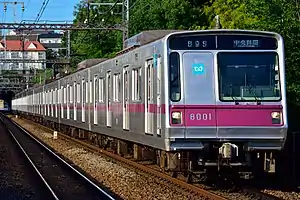Tokyo Metro 8000 series
The Tokyo Metro 8000 series (東京メトロ8000系, Tōkyō Metoro 8000-kei) is an electric multiple unit (EMU) train type operated by Tokyo subway operator Tokyo Metro on the Tokyo Metro Hanzomon Line in Tokyo, Japan. since 1981.[1]
| Tokyo Metro 8000 series | |
|---|---|
 Set 8101 in July 2017 | |
| Manufacturer | Kawasaki Heavy Industries, Kinki Sharyo, Nippon Sharyo, Tokyu Car Corporation |
| Constructed | 1980–1994 |
| Entered service | April 1981 |
| Refurbished | 2004–2015 |
| Number built | 190 vehicles (19 sets) |
| Number in service | 190 vehicles (19 sets) (as of 1 April 2017) |
| Successor | Tokyo Metro 18000 series |
| Formation | 10 cars per trainset |
| Capacity | 136 (48 seating) (end cars), 144/150 (51/54 seating) (intermediate cars) |
| Operator(s) | Tokyo Metro, previously TRTA |
| Depot(s) | Saginuma |
| Line(s) served | Z Tokyo Metro Hanzomon Line, DT Tokyu Den-en-toshi Line, TS Tobu Skytree Line, TNTobu Nikkō Line, TI Tobu Isesaki Line |
| Specifications | |
| Car body construction | Aluminium |
| Car length | 20,000 mm (65 ft 7 in)[1] |
| Width | 2,830 mm (9 ft 3 in)[1] |
| Height | 4,135 mm (13 ft 6.8 in) |
| Doors | 4 per side |
| Maximum speed | 100 km/h (60 mph)[1] |
| Weight | 318.1t (original), 294.8t (refurbished) |
| Traction system | Chopper control, later changed to IGBT-VVVF |
| Power output | 160 kW (original), 165 kW (refurbished) |
| Transmission | Westinghouse Natal (WN) drive; Gear ratio: 5.73 : 1 |
| Acceleration | 3.3 km/h/s[1] |
| Deceleration | 3.5 km/h/s (4.5 km/h/s for emergency brake)[1] |
| Electric system(s) | 1,500 V DC overhead |
| Bogies | SS-101, SS-035A |
| Braking system(s) | Electronically controlled pneumatic brakes with regenerative braking |
| Safety system(s) | Tokyo Metro CS-ATC, Tokyu CS-ATC, Tobu ATS |
| Coupling system | Janney coupler |
| Track gauge | 1,067 mm (3 ft 6 in) |
A total of 190 cars (19 ten-car sets) were built between 1980 and 1994 by Kawasaki Heavy Industries, Kinki Sharyo, Nippon Sharyo, and Tokyu Car Corporation.[2]
Technical details
The train shares some design similarities with the earlier Tokyo Metro 6000 series on the Chiyoda Line and the Tokyo Metro 7000 series on the Fukutoshin Line, mainly the asymmetrical front and bodyshell with some cosmetic changes.
Original sets
- Motor output: 160 kW
- MT ratio: 6M4T
- Total train power output: 3,840 kW
- Control system: Chopper control
Refurbished (B-refurbishment) sets
- Motor output: 165 kW
- MT ratio: 5M5T
- Total train power output: 3,300 kW
- Control system: IGBT-VVVF control
Formations
As of 2016, all of the 19 ten-car sets are refurbished formed as shown below, with car 1 at the Oshiage (northern) end.[3]
Original unrefurbished sets
| Car No. | 1 | 2 | 3 | 4 | 5 | 6 | 7 | 8 | 9 | 10 |
|---|---|---|---|---|---|---|---|---|---|---|
| Designation | CT1 | M1 | M2' | M1 | Mc2 | Tc1 | T2' | M1 | M2 | CT2 |
| Numbering | 8100 | 8200 | 8300 | 8400 | 8500 | 8600 | 8700 | 8800 | 8900 | 8000 |
Cars 2, 4, and 8 each have two lozenge-type pantographs.[3]
Refurbished sets
| Car No. | 1 | 2 | 3 | 4 | 5 | 6 | 7 | 8 | 9 | 10 |
|---|---|---|---|---|---|---|---|---|---|---|
| Designation | CT1 | M1 | T3 | M1 | Mc2 | Tc1 | T2' | M1 | M2 | CT2 |
| Numbering | 8100 | 8200 | 8300 | 8400 | 8500 | 8600 | 8700 | 8800 | 8900 | 8000 |
Cars 2, 4, and 8 each have two lozenge-type pantographs.[3]
Interior
Cars 3 and 9 in the refurbished sets have a wheelchair space.[3]
 Original style interior in February 2007
Original style interior in February 2007 Interior of a refurbished set in February 2007
Interior of a refurbished set in February 2007 LED passenger information display
LED passenger information display LCD passenger information display (refurbished set) in November 2010
LCD passenger information display (refurbished set) in November 2010
Underside Equipment
 FS035A bogie as used on the 8000 series
FS035A bogie as used on the 8000 series SS101 bogie as used on the 8000 series
SS101 bogie as used on the 8000 series ATC equipment as used on the 8000 series
ATC equipment as used on the 8000 series Chopper control device on the 8000 series
Chopper control device on the 8000 series VVVF inverter equipment as used on refurbished units
VVVF inverter equipment as used on refurbished units
History
The first 8000 series trains were introduced in 1981.[2]
From 2004, a programme of refurbishment commenced, with some sets receiving VVVF control and three-phase motors.[2] In February 2016, set 8114 received full-colour LED destination indicators.[4]
References
- The 地下鉄 [The Subway] (in Japanese). Japan: Sansuisha. 29 September 2004. p. 40. ISBN 978-4-06-366218-4.
- 首都圏鉄道完全ガイド 地下鉄・その他私鉄編 [Tokyo Area Complete Railway Guide - Subway and Other Private Lines] (in Japanese). Japan: Futabasha. 23 July 2014. p. 28. ISBN 978-4-575-45450-5.
- 私鉄車両編成表 2015 [Private Railway Rolling Stock Formations - 2015] (in Japanese). Japan: Kotsu Shimbunsha. 23 July 2015. p. 69. ISBN 978-4-330-58415-7.
- 東京メトロ8000系の行先表示器がフルカラーLED化される [Tokyo Metro 8000 receives full-colour LED destination indicators]. Japan Railfan Magazine Online (in Japanese). Japan: Koyusha Co., Ltd. 12 February 2016. Retrieved 12 February 2016.
External links
| Wikimedia Commons has media related to Tokyo Metro 8000 series. |
- Tokyo Metro Hanzōmon Line 8000 series information (in Japanese)
